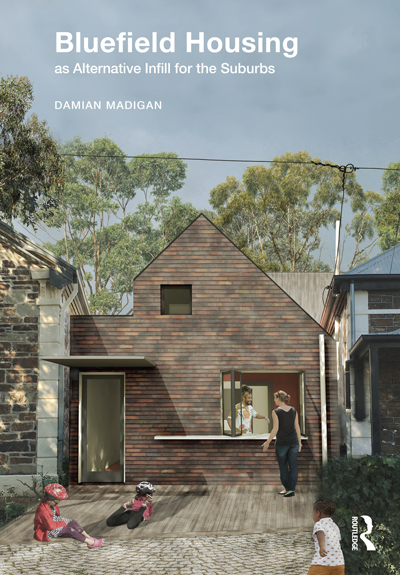The latest books from UniSA researchers
Bluefield Housing as Alternative Infill for the Suburbs
By UniSA senior lecturer in architecture Dr Damian Madigan

Suburbanised cities share a common dilemma: how to transition to more densely populated and socially connected urban systems while retaining low-rise character, avoiding gentrification, and opening neighbourhoods to more diverse housing choices. Bluefield Housing offers a new land definition and co-located infill model addressing these concerns, through describing and deploying the types of ad-hoc modifications that have been undertaken in the suburbs for decades. Extending green-, brown-, and greyfield definitions, it provides a necessary middle ground between the ‘do nothing’ attitude of suburban preservation and the ‘do everything’ approach of knock-down-rebuild regeneration.
An adjunct to ‘missing middle’ and subdivision densification models, with a focus on co-locating homes on small lots, Bluefield Housing presents a unified design approach to suburban infill: retrofitting original houses, retaining and enhancing landscape and urban tree canopies, and delivering additional homes as low-rise additions and backyard homes suited to the increasingly complex make-up of households.
Extensively illustrated by the author with engaging architectural design studies, Damian Madigan describes how existing quirks of suburban housing can prompt new forms of infill, explains why a new suburban densification model is not only necessary but can be made desirable for varied stakeholders, and charts a path towards the types of statutory and market triggers required to make Bluefield Housing achievable. Using Australian housing as an example but addressing universal concerns around neighbourhood character, demographic needs, housing diversity, dwelling flexibility, and landscape amenity, Bluefield Housing offers innovative suburban infill ideas for policy makers, planners, architects, researchers and students of housing and design studies, and for those with a stake in the future of the suburbs.
The book is available from Routledge.
Other Stories
- Time off means weight on for Aussie kids
- $10m precision engineering centre for defence manufacturing opens at Mawson Lakes
- Many people willing to sacrifice salary to work from home
- ‘I can see the characters’: how reading aloud to patients can break through ‘cancer fog’
- From the Vice Chancellor: Looking forward while reflecting on a stellar year
- Achievements and Announcements
- 2023 Wrapped: Watch highlights from the year that was
- Crows Captain prepares to kick goals in the classroom
- UniSA Online students set for overseas immersions thanks to New Colombo Plan Scholarships
- Podiatry team visits Kiribati to kickstart diabetic footcare
- In Pictures: Unstoppable Awards + Staff Service Awards
- The latest books from UniSA researchers




